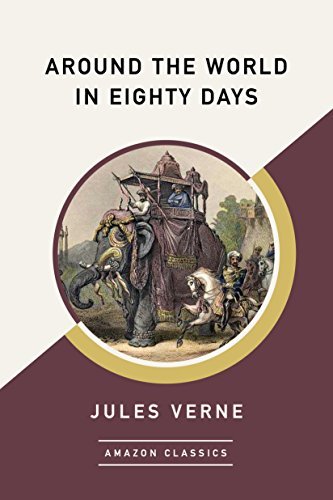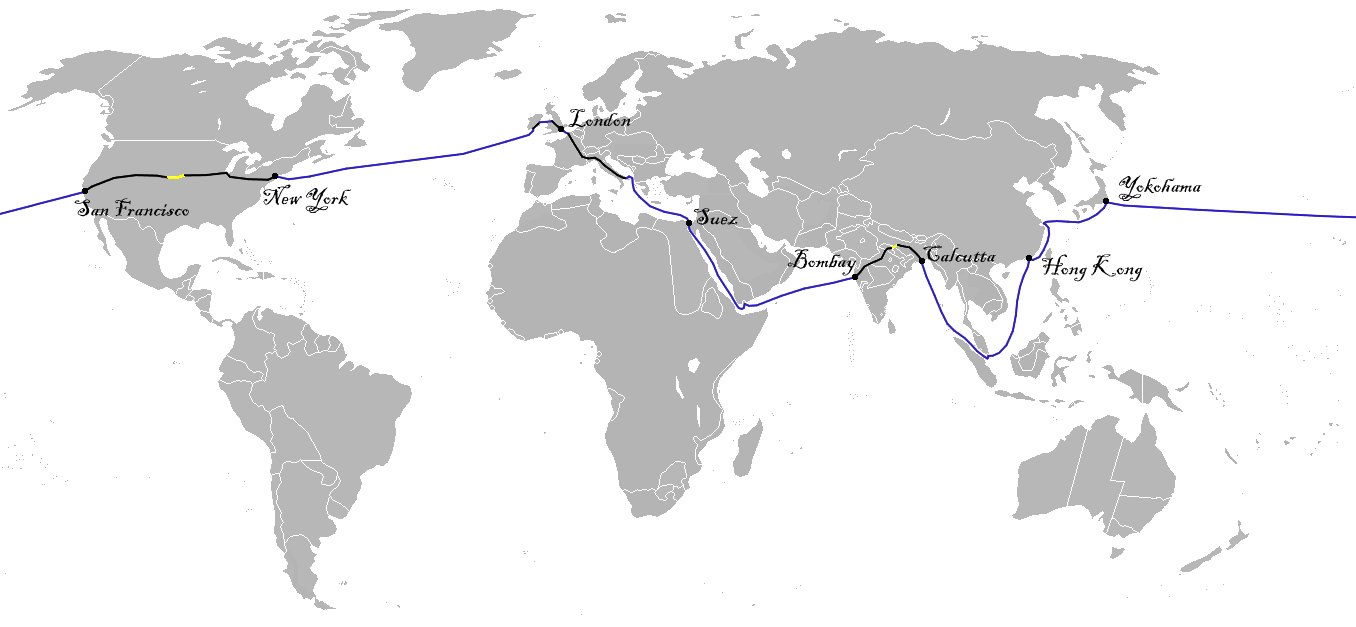Around the World in Eighty Days Book Review

Around the World in Eighty Days by Jules Verne, translated by George Makepeace Towle First published 1872, AmazonClassics edition November 21, 2017
I don’t think I’ve reviewed anything by Verne at the blog. So let’s look at Around the World in Eighty Days [Amazon link]. I selected this one because of this blog post by DarwinCatholic, Around the World in 80 Days - Thoughts and Adaptations. It was this passage in particular that made me want to read Verne’s classic:
Fogg's single-minded dedication to all this becomes endearing over the course of the novel. Indeed, I gradually developed the theory that Fogg is what we would call "on the spectrum" today: He has developed an encyclopedic knowledge of the whole world and the means of transport that fascinate him while sitting in the Reform Club reading newspapers six hours a day. He likes his days to be utterly predictable, with a schedule for his valet written out down to the minute, but he is so passionate in defending his knowledge that it's possible to circumnavigate the world in 80 days that he makes a high stakes bet that will take him around the world. Once he's on the trip he's utterly focused on the trip itself, ignoring politeness, danger, convention, and also the scenery and cultures around him. He is always and utterly focused on the problem at hand and doesn't let himself get distracted by the humans around him except when it penetrates his attention that someone is in need of help.
This is one of those things that once seen, cannot be unseen. Verne absolutely nailed a description of what we would now call Autism Spectrum Disorder more than 100 years before that term even existed. Having just been immersed in the literature for that condition, I can report that Verne’s descriptions ring true.
Take this description of Fogg’s routinized behavior:
He was so exact that he was never in a hurry, was always ready, and was economical alike of his steps and his motions. He never took one step too many, and always went to his destination by the shortest cut; he make no superfluous gestures, and was never seen to be moved or agitated.
…
Phileas Fogg, having shut the door of his house at half-past eleven, and having put his right foot before his left five hundred and seventy-five times, and his left foot before his right five hundred and seventy-six times, reached the Reform Club….
Or this one of how he reacts to the Parsi widow he saves from suttee, emotionally distant and wholly reliant on explicit rules of conduct:
He treated her with the strictest politeness, but with the precision of an automaton, the movements of which had been arranged for this purpose.
But even more striking than Verne’s knack for description was the manner in which Fogg was wholly embedded within wider society. For all our talk about inclusiveness, contemporary American society is far less accepting of this kind of eccentricity. This isn’t the only book that gives me this impression either. Kenneth Grahame’s The Wind in the Willows also includes a level of tolerance for odd behavior that would be completely out of place now.
Fogg’s fellow club members happily play cards with him every day, as whist is an obsession with him, but card games are something that non-aspies can get obsessed with too. Everyone knows he’s odd, but no one cares.
I think it worth addressing the class angle as well, Fogg is absolutely loaded, what the British would call middle class but Americans would probably think of as upper class in our distorted money only version of class. Brendan at DarwinCatholic did the conversion, and Fogg’s net worth is something like $6 million in today’s dollars. His money and his social standing really do give him the power to fully indulge his routines.
Would this be harder for a poorer man? Absolutely. Fogg is a member of the idle rich, and doesn’t need to work to earn his meals or his housing. He can spend all day reading the newspapers instead, in a specific order of course. But can I imagine a man like Fogg working in some routine clerical job, and then retiring to a pub to play cards all night? You bet.

By Roke - Self-published work by Roke, CC BY-SA 3.0, https://commons.wikimedia.org/w/index.php?curid=1436374
As a book, Around the World in Eighty Days has a little different structure and pacing than we are used to now, but I think Brendan is right that the closest contemporary analogue is Andy Weir’s The Martian. Like Weir’s space adventure, Verne’s book is all about the latest technology and how a clever man can use it to solve a daunting problem. The gulf in time can make this a little harder to appreciate, but the similarity is there.
Where the books differ is that the protagonist is not the primary POV character. Passepartout, the everyman Frenchman serves that function. Fogg is the one who acts on the world and bends it to his will, but his very oddness would have made it harder to relate to him for most people, so Passepartout stands in for us.
Another thing that stands out to me is how unmaterialistic Fogg is. As rich as he is, money means nothing to him, compared to winning a bet. However, winning a bet is something Fogg is willing to abandon when he sees that someone is in danger, first Aouda in India, then Passepartout in America. This reminds me of Rick Stump’s analysis of Conan the Barbarian I talked about in February. Fogg’s motivations aren’t really natural to us anymore.
Around the World in Eighty Days is a pretty brief read. Books have tended longer in recent years, so it is fun to get into and out of a complete story so quickly. It is also fun to see the world from a perspective different from your own. Verne’s Victorian-era French POV offers a little different flavor on an era of history I’m reasonably familiar with. I will happily read more of Verne’s work after this, my time here was well spent.



Comments ()